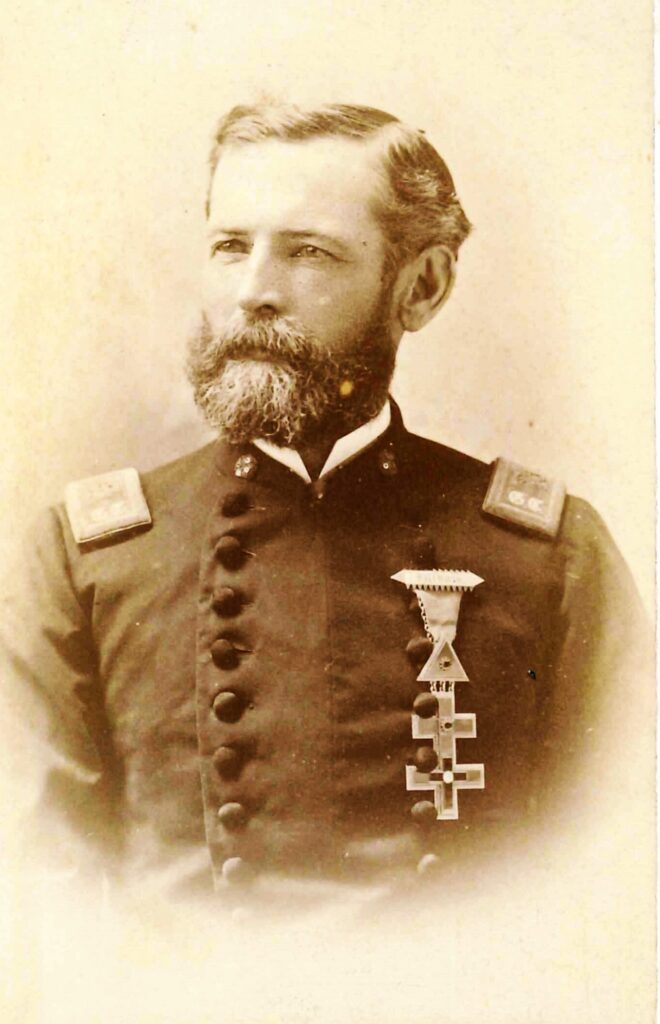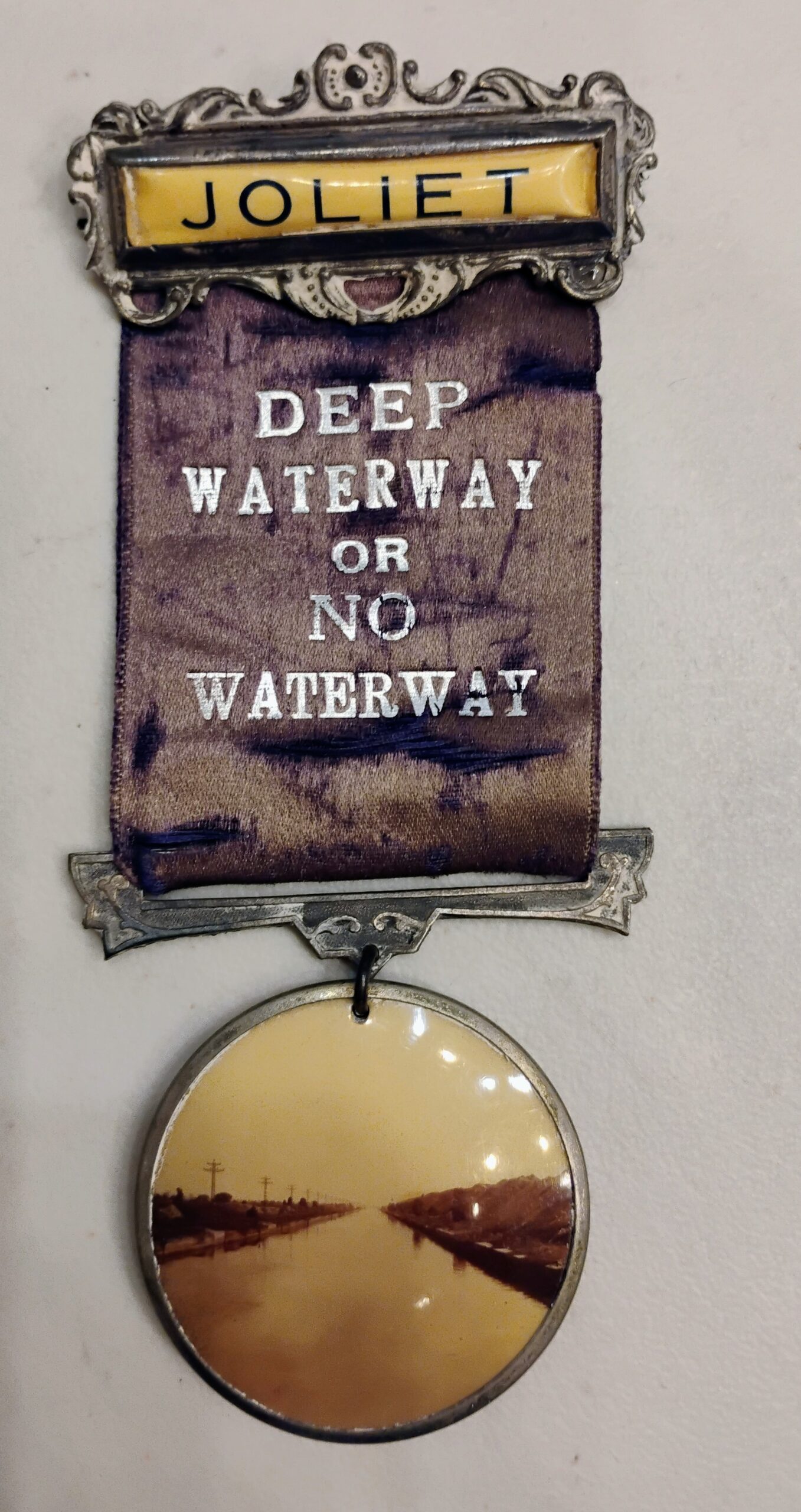James Elwood, a man with many hats

By Sandy Vasko
When I bring up the name of James Elwood at the museum, people usually say, “Oh, that’s the guy the town of Elwood is named after.” I have to say, “No, that was his daddy. Nelson, who was part owner of the first railroad from Joliet to Springfield.”
James was the primary mover and shaker in Will County during his life time.
In the “Portrait Biography” of Will County, he is described like this: “James Elwood has been predominantly identified with building, real estate, and many other public enterprises
of Joliet. He is an able financier, has a meritorious record as a soldier, and has served
with honor in public capacities. He is the eldest son and only surviving child of the late Nelson D. Elwood.
“He was born in Lockport, May 6, 1839, moved to Joliet in 1843, and here he obtained
his fundamental education. He spent three years at the military school in New Haven, Conn., and the years 1857-58-59 in Geneva, Switzerland, and Berlin, Prussia, closing his schooling at the
Frederick William University, in the last-named city.
“In luly1862, Mr. Elwood formed a company and entered the Union service as Captain of Company B, One Hundredth Illinois Infantry. During the battle of Stone River, January 2, 1863, he was appointed Assistant Adjutant-General of the brigade, and in that capacity, he continued to serve until the close of army life. His gallantry was unmistakable.”
As an aside here, James’ two brothers died, and his mother wrote a letter to President Lincoln asking him to let her son go as he was now all she had. Lincoln honored her request, but I believe James felt some guilt leaving his comrades to go home to Mommy.
“At the conclusion of the war Mr. Elwood spent two years in Cincinnati, Ohio, and three in Chicago, and in 1870 returned to Joliet with his family. He served two years as a member of the City Council, his term beginning in 1872, ended in 1877, he was elected Mayor, holding the chief place in the municipal government two years.
“He has been active in Masonic affairs, and in 1881 served as Grand Commander of Knights Templar of Illinois. Mr. Elwood has been connected with the Joliet Gas Company since 1861, was Secretary for twenty years and is at present Managing Director. In connection
with ex-Mayor Paige he built the Telephone Exchange here, and for four years he managed the
water works now owned by the city. He is Secretary and Superintendent of Oakwood Cemetery.”
How James managed to do all these things is remarkable. We do know that he took time out to ply the waters of the I & M, Des Plaines and Kankakee in what was described as his “steamer yacht,” called the “Vinette.”
Perhaps that is why, when Chicago started putting raw sewage into the I & M Canal he led the fight for clean water in the rivers and canals in northern Illinois.
We read on January 14, 1879 in the Joliet Signal: “The citizens of Joliet and vicinity are invited to attend a meeting at the Court House in Joliet, on Friday evening Jan. 17th, to take such action as may be determined upon for the purpose of continuing the Illinois and Michigan Canal, and abating the nuisance arising from the foul water now passing through said canal. Hon. J. O. Glover and Supt. Wm. Thomas will be present to address the meeting. Signed, Jas. G. Elwood.”
A year later, he had gotten nowhere, so he called the “Canal Stench Convention” to order. “In accordance with a previous call a convention was held in this city last Tuesday afternoon, to devise means, if possible, to get rid of the stench coming from the canal in consequence of the drainage of Chicago sewerage the canal and its channel. Delegations were present from a number of towns and villages on the line of the obnoxious stench.”
In 1880, James Elwood became president of the Chicago Board of Trade. He convinced the Board members to attend a convention in Ottawa to resolve the stench situation. From the Joliet Signal: “March 23, 1880 Ship Canal Meeting – The meeting held in Ottawa on last Wednesday in favor of the enlargement of the canal and improvement of the Illinois river, was a success as far as the character of the attendance and the enthusiasm manifested were concerned. It was held in the Opera House and it is estimated that about a thousand were present. About fifty of our most prominent business men were present, as well as delegations from Chicago and other cities.”
Although the engineers found that improving the I & M was not practical, Elwood did not give up. Instead, he enlisted people into what would become the solution, the Deep Water Canal, with the inclusion of the Sanitary & Ship Canal, it became the canal system that is still in use today.
One of the Will County Historical Museum’s most precious artifacts is a white rose bud that had once decorated President Lincoln’s funeral bier. It was given to James and his wife as a wedding gift in 1868 by General Haynie, along with his many other ribbons and honors.
He was certainly Will County’s most famous advocate of his time.
Sandy Vasko is Director of the Will County Historical Museum & Research Center and President of the Will County Historical Society.

A ribbon from the James Elwood collection. It was given to him for his leadership on the clean water projects